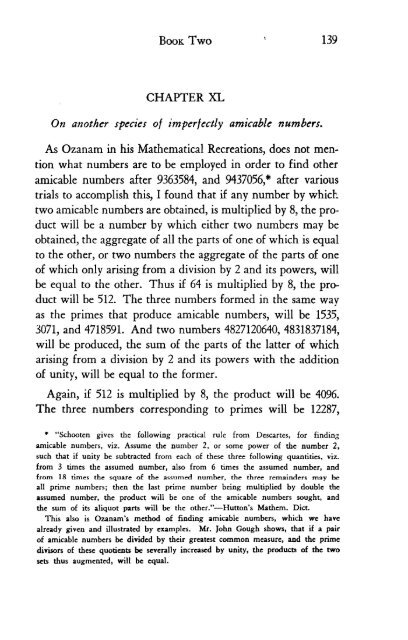Taylor - Theoretic Arithmetic.pdf - Platonic Philosophy
Taylor - Theoretic Arithmetic.pdf - Platonic Philosophy
Taylor - Theoretic Arithmetic.pdf - Platonic Philosophy
You also want an ePaper? Increase the reach of your titles
YUMPU automatically turns print PDFs into web optimized ePapers that Google loves.
BOOK Two<br />
CHAPTER XL<br />
On another species of imperfectly amicable n urn bers.<br />
As Ozanam in his Mathematical Recreations, does not mention<br />
what numbers are to be employed in order to find other<br />
amicable numbers after 9363584, and 9437056," after various<br />
trials to accomplish this, I found that if any number by which<br />
two amicable numbers are obtained, is multiplied by 8, the product<br />
will be a number by which either two numbers may be<br />
obtained, the aggregate of all the parts of one of which is equal<br />
to the other, or two numbers the aggregate of the parts of one<br />
of which only arising from a division by 2 and its powers, will<br />
be equal to the other. Thus if 64 is multiplied by 8, the product<br />
will be 512. The three numbers formed in the same way<br />
as the primes that produce amicable numbers, will be 1535,<br />
3071, and 4718591. And two numbers 4827120640, 4831837184,<br />
will be produced, the sum of the parts of the latter of which<br />
arising from a division by 2 and its powers with the addition<br />
of unity, will be equal to the former.<br />
Again, if 512 is multiplied by 8, the product will be 4096.<br />
The three numbers corresponding to primes will be 12287,<br />
* "Schooten gives the following practical rule from Descartes, for finding<br />
amicable numbers, viz. Assume the number 2, or some power of the number 2,<br />
such that if unity be subtracted from each of these three following quantities, viz.<br />
from 3 times the assumed number, also from 6 times the assumed number, and<br />
from 18 times the square of the assumed number, the three remainders may be<br />
all prime numbers; then the last prime number being multiplied by double the<br />
assumed number, the product will be one of the amicable numbers sought, and<br />
the sum of its aliquot parts will be the other.*'-Hutton's Mathcm. Dict.<br />
This also is Ozanam's method of finding amicable numbers, which we have<br />
already given and illustrated by examples. Mr. John Gough shows, that if a pair<br />
of amicable numbers be divided by their greatest common measure, and the prime<br />
divisors of these quotients be severally increased by unity, the products of the two<br />
sets thus augmented, will be equal.
















